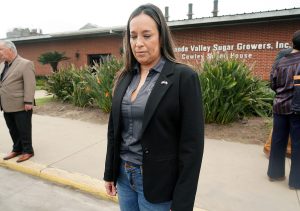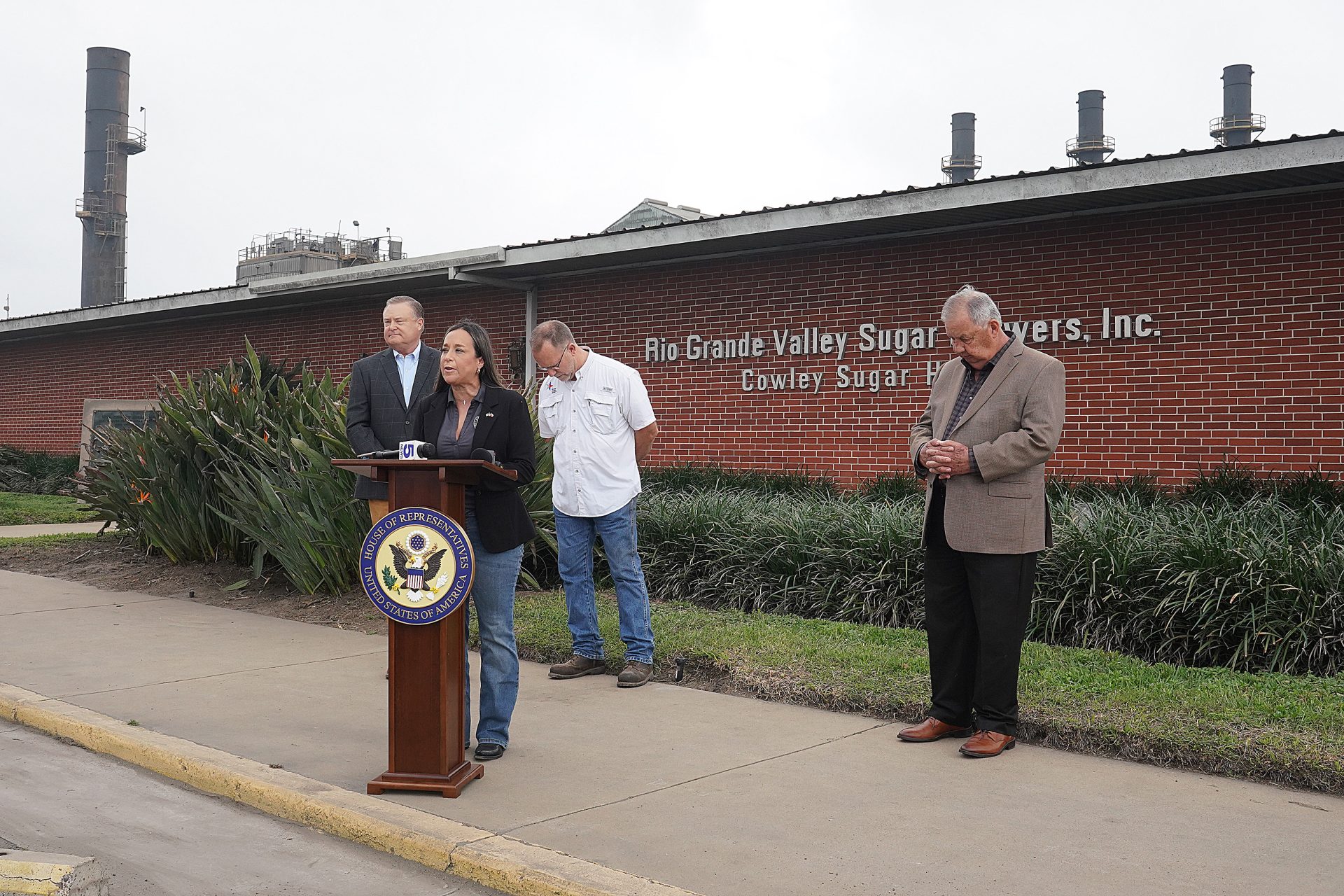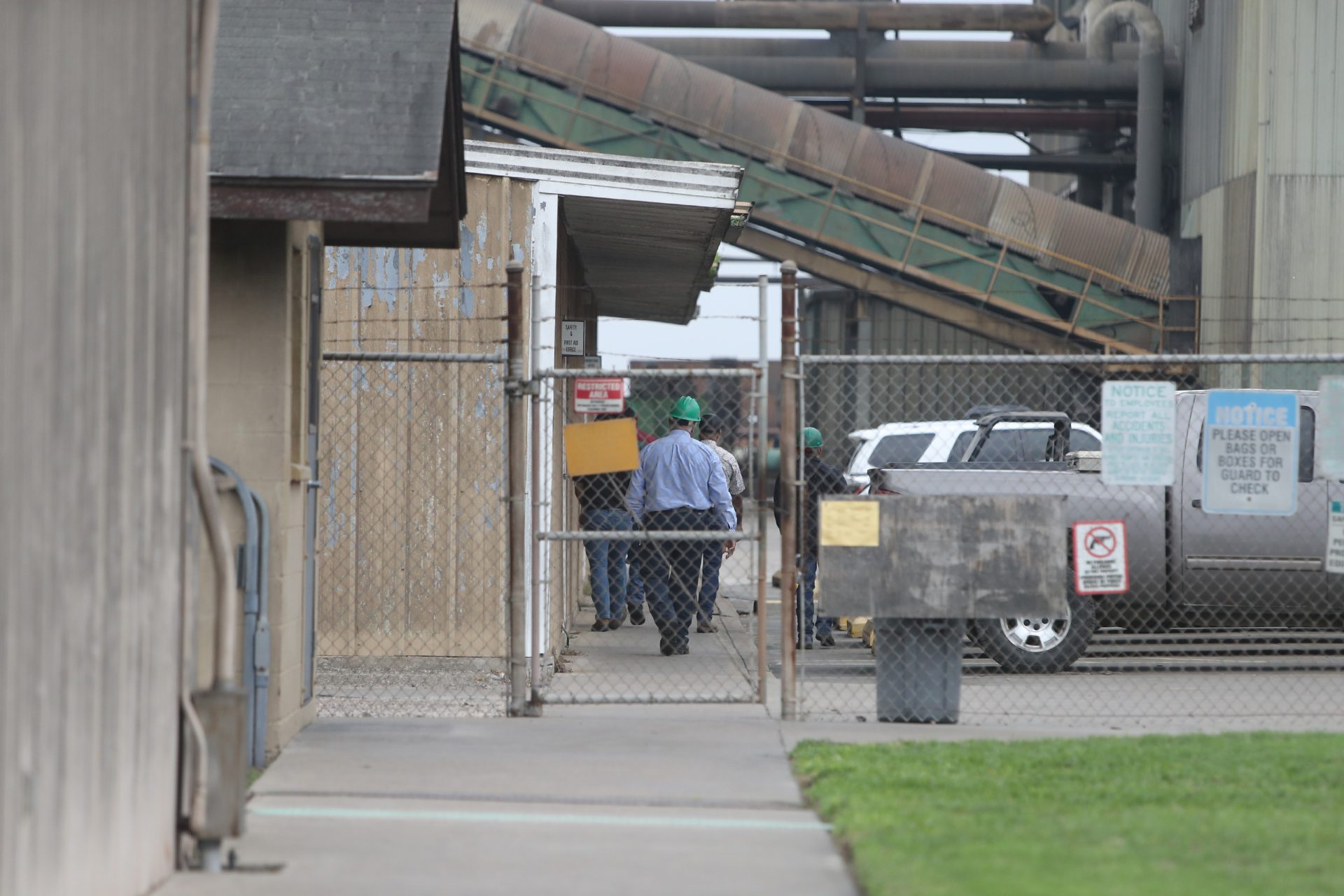 Rep. Monica de la Cruz waits to talk to TV media as she speaks about the stoppage of sugar processing in front of the W.R. Cowley Sugar House on Monday, March 4, 2024, in Santa Rosa. (Joel Martinez | jmartinez@themonitor.com)
Rep. Monica de la Cruz waits to talk to TV media as she speaks about the stoppage of sugar processing in front of the W.R. Cowley Sugar House on Monday, March 4, 2024, in Santa Rosa. (Joel Martinez | jmartinez@themonitor.com)SANTA ROSA — Standing in the shadows of the last sugar mill in Texas on a foggy Monday morning, local leaders didn’t mince words on the many failures that have led to its recent closure. Nor did they waste time in calling for immediate action from federal authorities to avert further disaster.
“Today, I once again call on the Mexican government to act swiftly to avert any further damages to this region and to our nation,” U.S. Rep. Monica De La Cruz, R-McAllen, said outside the sugar mill.
“This shouldn’t have to be said, but access to water is nonnegotiable,” the congresswoman added.
Less than two weeks ago, the farming cooperative that oversees the mill — Rio Grande Valley Sugar Growers Inc., or RGVSG — announced the end of all sugar production in the Rio Grande Valley due to prolonged water scarcity.
 A worker cultivates a field with the W.R. Cowley Sugar House in the background on Monday, March 4, 2024, in Santa Rosa. (Joel Martinez | jmartinez@themonitor.com)
A worker cultivates a field with the W.R. Cowley Sugar House in the background on Monday, March 4, 2024, in Santa Rosa. (Joel Martinez | jmartinez@themonitor.com)Over the last few years, farmers have been forced to plant fewer and fewer acres of sugarcane, an incredibly water-hungry crop, due to the unreliability of water supplied to the Rio Grande by tributaries located largely in Mexico.
After taking a hard look at the few acres that remained, the sugar growers realized it was no longer economically feasible to continue operations.
In essence, things had reached a point where not enough acres would be in production — nor would those thirsty acres produce a high-enough caliber of cane — to meet overhead costs, much less produce a profit.
And at the heart of the issue is a consistent lack of water from Mexico, which is obligated by a 1944 binational water sharing treaty to deliver 1.75 million acre-feet of water to the United States in five-year cycles.
But repeatedly over the last three decades, Mexico has fallen behind on those obligations.
And now, four years into the current cycle, Mexico is so hopelessly in arrears that it physically does not have enough water stored in its inland reservoirs to deliver on the deficit.
 Rep. Monica de la Cruz speaks about the stoppage of sugar processing in front of the W.R. Cowley Sugar House on Monday, March 4, 2024, in Santa Rosa. (Joel Martinez | jmartinez@themonitor.com)
Rep. Monica de la Cruz speaks about the stoppage of sugar processing in front of the W.R. Cowley Sugar House on Monday, March 4, 2024, in Santa Rosa. (Joel Martinez | jmartinez@themonitor.com)For Congresswoman De La Cruz, the closing of the Santa Rosa sugar mill is but the canary in the coalmine signaling a larger, and more dangerous crisis ahead.
On Monday, she demanded that the U.S. State Department take immediate action to enforce the treaty.
As local farmers and water officials from across the Valley have spent years sounding the alarm, U.S. Secretary of State Antony Blinken has remained frustratingly silent, they say.
The same has held true for De La Cruz, who has sent numerous letters and requests for meetings to the secretary.
“Unfortunately, as of today, we have not received any response from Secretary Blinken,” De La Cruz said.
“When it comes to national security, food security is national security. So, I’ve been very disappointed in Secretary Blinken’s lack of response to our request for a meeting,” she added a moment later.
As a result, De La Cruz, along with U.S. Rep. Henry Cuellar, D-Laredo, have coauthored a bill demanding that Blinken use the diplomatic tools at his disposal to force Mexico’s compliance with the treaty and to make an immediate water delivery.
 Tudor Uhlhorn speaks about the the stoppage of sugar processing during a press conference in front of the W.R. Cowley Sugar House on Monday, March 4, 2024, in Santa Rosa. (Joel Martinez | jmartinez@themonitor.com)
Tudor Uhlhorn speaks about the the stoppage of sugar processing during a press conference in front of the W.R. Cowley Sugar House on Monday, March 4, 2024, in Santa Rosa. (Joel Martinez | jmartinez@themonitor.com)De La Cruz was also joined Monday by Hidalgo County Judge Richard F. Cortez, RGVSG board chairman Tudor Uhlhorn and Texas Farm Bureau representative Brian Jones.
Echoing the congresswoman’s disappointment, Cortez said federal leaders are failing in their responsibilities to the region.
“Washington has a duty to us. They need to perform on that duty to us,” Cortez said.
But for Uhlhorn and Jones, two men with long family legacies of farming in the Valley, that disappointment was more like simmering rage.
“This mill is not closing because of fiscal mismanagement. This mill is not closing because the price of sugar is too low. This mill is closing because Mexico has failed to deliver the water that they owe us,” Jones said.
A row crop farmer growing cotton, corn and sorghum, Jones said he grew up seeing the sugar mill from his family’s farm just five miles to the west. The continued lack of water spells “dire straits” for other Valley agriculture, including his own, he said.
 Workers walk through the fence door in front of the W.R. Cowley Sugar House on Monday, March 4, 2024, in Santa Rosa. (Joel Martinez | jmartinez@themonitor.com)
Workers walk through the fence door in front of the W.R. Cowley Sugar House on Monday, March 4, 2024, in Santa Rosa. (Joel Martinez | jmartinez@themonitor.com)Uhlhorn, meanwhile, spoke of Mexico as self-serving, of refusing to share water, even during times of abundance.
He pointed to a tropical weather system, dubbed Invest92L by the National Weather Service, that dumped more than 2.6 million acre-feet of water in the Rio Grande’s Mexican watershed in the summer of 2022.
Aside from a few thousand scant gallons of so-called “wild water” that couldn’t be trapped by Mexican dams, the U.S. received next to none of that water, Uhlhorn said.
“You might ask yourself — despite being significantly behind on their water delivery obligations to the U.S. — how much of that 2.6 million acre-feet did Mexico use to reduce its delivery deficit to the U.S. and the water users of South Texas? The answer is zero,” Uhlhorn said.
In further irony, the end of Valley sugar means the resultant supply gap will now be filled by Mexican farmers, Uhlhorn said.
“In essence, Mexico uses our water to grow crops to compete against us,” he said.
 Tudor Uhlhorn speaks about the stoppage of sugar processing during a press conference in front of the W.R. Cowley Sugar House on Monday, March 4, 2024, in Santa Rosa. (Joel Martinez | jmartinez@themonitor.com)
Tudor Uhlhorn speaks about the stoppage of sugar processing during a press conference in front of the W.R. Cowley Sugar House on Monday, March 4, 2024, in Santa Rosa. (Joel Martinez | jmartinez@themonitor.com)Ultimately, farmers like Uhlhorn and Jones want federal authorities to stop putting them on the back burner of international diplomacy.
Again, Uhlhorn mentioned a salient piece of pertinent history — this time, surrounding the five-year process between 1939-1944 that led to the successful negotiation of the water sharing treaty.
“You might know that the United States was a little bit preoccupied during that period doing a little thing and fighting World War II,” Uhlhorn said.
“So, it’s not unusual for the Secretary of State to be able to walk and chew gum at the same time. So, we would call on Secretary Blinken to step in and do what’s right,” he added a moment later.
RELATED READING:
Sugar mill closing amid water crisis; $100 million impact expected
The post Valley leaders blast feds on failed Mexican water deliveries appeared first on MyRGV.com.
 (2).png)
 1 month ago
60
1 month ago
60








 English (US)
English (US)